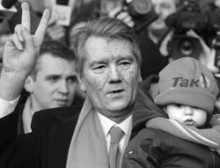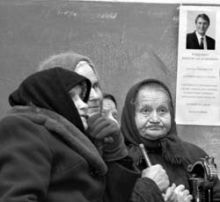The election marathon is drawing to a close, and it’s quite obvious whom Ukraine will have for its next president. Post-election Ukraine is looking forward to evolutionary changes free from any social upheavals. Analysts believe that in the coming weeks we will witness transformations in the power structure, the laying down of new rules for the political game, reshufflings in parliament, and political elites spilling over from one camp into the other and vice versa. The one and the same political reality is acquiring new characteristics. We must bear in mind that it was during the December 26 rerun of the runoff elections that preparations for the 2006 parliamentary elections began. Will the 2006 election put an end to the old political epoch and usher in a new political era with completely different goals and challenges? Everything will depend on the future steps taken by the victors and the vanquished, including their steps in the reciprocal direction. Experts have voiced differing opinions in this connection. Among other things, the voting process has made it possible to examine the influence of the latest ruling by the Constitutional Court on the December 26 balloting. According to Volodymyr Fesenko, chairman of Penta Applied Political Studies Center, this ruling did not affect the electoral process or sway voters.
Mr. Fesenko is certain that those in power hoped that the Constitutional Court would pass its ruling after the elections, which could be then used as a pretext for future lawsuits filed to have the election results nullified. Meanwhile, Vitaly Bala, director of the Situations Modeling Center, has stressed that the decision to lodge an appeal with the Constitutional Court was untimely and ill-advised. It has given Yushchenko’s team an excuse to terminate all the previous arrangements with those in power, who voted to amend the election law in a package with the constitutional reform only to call into question what they voted for.
As for the relationship between the victors and the vanquished, experts say that it will be influenced by the political reform, which in its current wording is a launch pad for a political rematch for the vanquished and an obstacle for the victors’ final consolidation of their victory. Sophia Social Studies Center director Andriy Yermolayev has mentioned two possible scenarios for the development of this process. An evolutionary scenario envisions the possibility for a dialog on equal terms among different elites. Unless the new power decides to backpedal on the political reform, we can expect the nation’s industrial elite to be widely represented in the new parliament. Under this scenario Viktor Yushchenko and his team will attempt to find points of understanding with the regional elite of Ukraine’s east and will look for new allies among the former and current supporters of Viktor Yanukovych. Volodymyr Fesenko is of the same opinion. He believes there is a different degree of support for Yanukovych among the elites in every oblast other than Donetsk. Therefore, Yanukovych runs the risk of no longer being perceived as a regional leader and champion of the interests of the industrial east and being reduced to merely a Donetsk leader. Indeed, on the one hand many eastern supporters of Viktor Yanukovych are disappointed and resentful, but on the other hand they expect the new president to take steps in their direction. Future stabilization of the situation in the country will primarily depend on whether Viktor Yushchenko will manage to establish a dialog with this region. Moreover, Vadym Karasiov believes that some regional elites in the east did not so much support Yanukovych as they did not support Yushchenko. This means that Yushchenko lacks enough resources to win legitimacy in the eastern regions. Mr. Karasiov believes that the new president must propose a new draft of the political reform, because the orange revolution has not been meant to install new people in the old system.








